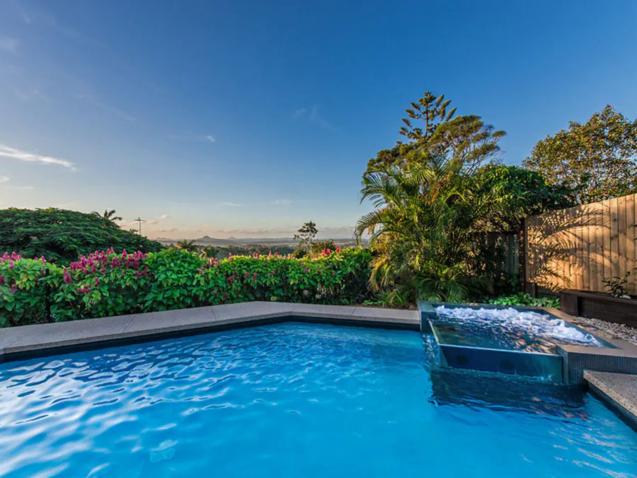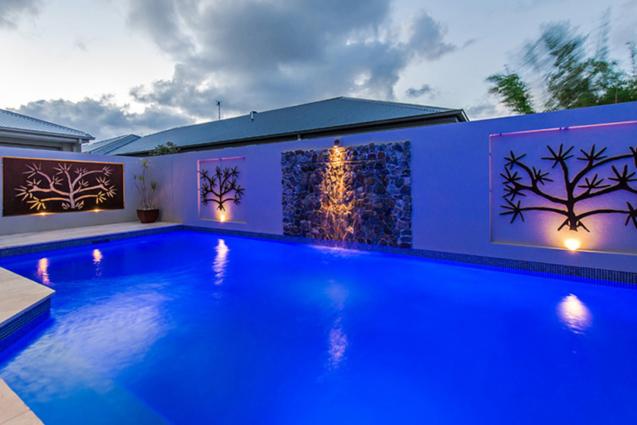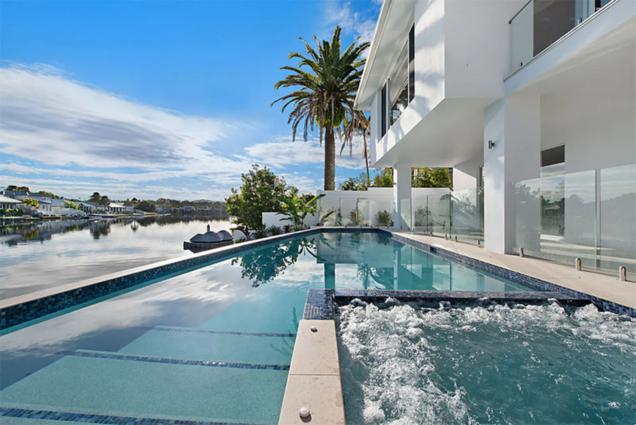
How Much Does an In-Ground Pool Cost to Build in 2023?
By Ecozen Pools + Landscapes|August 22, 2023
A scorching summer day, the sun shining brightly overhead, and you, basking in the refreshing waters of your very own in-ground pool. Sounds like a dream come true, doesn't it? But before you start envisioning yourself floating effortlessly in crystal-clear waters, it's important to address the burning question on everyone's mind: just how much does it cost to have an in-ground swimming pool built in 2023?
Factors Affecting Pool Construction Costs
When it comes to building a pool, there are several factors that can affect the overall cost of the project. One of the most important factors is the size, shape, and depth of the pool. The larger, more complex, and deeper the pool, the higher the price tag.
A more traditional rectangular shape is usually less expensive compared to a custom shape. An irregular or free-form pool will require more detailed planning and precise construction, resulting in additional costs. While adding additional depth to the pool also adds to the cost. This is because the deeper the pool, the more excavation, plumbing, and concrete pour needed.
Water features such as waterfalls, fountains, and spouts are popular options to add to a pool design. Not only are these features aesthetically pleasing, but they also help improve the pool's circulation. However, these added water features will drive up the cost. Adding lights to the pool can also enhance the swimming experience and improve the pool's safety. These lights add an additional expense to the overall project.
Landscaping is another factor that can impact the cost of a pool. A well-designed landscape can make the pool area look fantastic and create a stunning atmosphere. However, many landscapes require additional excavation and grading, as well as more plant material and installation costs.
The materials used for the construction of the pool also play a significant role in the overall cost. Concrete swimming pools are the most expensive option, but they last the longest. Vinyl pools are less costly to install, but they need periodic liner replacements and have a shorter lifespan. Fiberglass pools are typically the most affordable, but they have limited size and shape options.
Average Cost Considerations
In-ground pools can range significantly in price depending on a variety of factors, including size, materials, and location. Here's what you need to know about average cost considerations for an in-ground pool.
Size Matters
It's no surprise that the size of your pool will have a big impact on the overall cost. Generally speaking, the larger the pool, the higher the price tag. According to HomeAdvisor, the average cost for a 4x8 metre in-ground pool is around $35,000, while a 7x13 metre pool can cost upwards of $60,000 or more. Keep in mind that these figures are just for the pool itself, and don't include any additional features or landscaping.
Materials: The type of material used to build your pool can also have a significant impact on the cost. Vinyl, fiberglass, and concrete are all popular choices, with concrete generally being the most expensive. In general, you can expect to pay around $150 per square metre for a concrete pool, while vinyl or fiberglass can be closer to $75 per square metre. It's also important to consider long-term maintenance costs - while concrete is more expensive upfront, it may require less maintenance over time.
Location: Where you live can have a big impact on how much you'll pay for an in-ground pool. Labour costs vary significantly based on region, so it's important to factor in local rates when planning your budget. It's also worth considering local regulations - some areas may require additional permits or safety features like fencing, which can add to the overall cost.
Additional Expenses: When budgeting for your pool, make sure you're considering all the additional expenses that can quickly add up. This might include permits, fencing, landscaping, decking, and other features like slides or waterfalls. Depending on the specifics of your project, these additional costs could add anywhere between $3,000 to $10,000 to your overall budget.
While it's important to have a good sense of what you can expect to pay for an in-ground pool, it's also worth noting that these are just averages. Your specific project may end up costing more or less depending on a variety of factors. Ultimately, the best way to get an accurate estimate is to work with a reputable pool contractor who can help you understand the unique costs associated with your project.
Financing Options
There are a variety of ways to fund your dream pool project.
Personal Savings
Using personal savings to pay for your pool is the most straightforward option. If you have the funds saved up, it can be a convenient way to avoid taking on debt. Here are some pros and cons to consider:
Benefits
A home equity loan allows you to borrow a portion of the equity in your home, using your house as collateral. Some of the pros and cons of this financing option include:
Benefits
If you don't have personal savings or don't want to use your home equity, pool-specific financing programs may be an option. These programs are designed to finance pool construction and are offered by many pool installation companies. Here are some things to keep in mind.
Benefits
Owning an in-ground pool may seem like a luxury, but it offers more benefits than just a refreshing dip on a hot day. Having a pool can have many positive impacts on both physical and mental wellbeing.
For starters, having a pool is an excellent way to promote physical exercise. Swimming is a low-impact form of exercise that is easy on the joints and has been shown to be excellent for cardiovascular health. Regularly using the pool can lead to improvements in endurance, muscle strength, and flexibility. Best of all, it's an exercise that can be enjoyed by people of all ages, making it a great way for families to stay active.
Beyond physical benefits, owning an in-ground pool can also provide much-needed mental relaxation. Studies have shown that spending time around water, such as a pool, can have restorative and stress-relieving effects. Whether you're swimming, lounging on a float, or simply enjoying the soothing sound of the water, time spent by the pool can promote relaxation and decrease stress levels.
In addition to the physical and mental benefits of owning a pool, it can also be an excellent social hub for family gatherings and social events. A pool provides an inviting space for barbecues, pool parties, and other outdoor gatherings that can bring families and friends closer together. It's also a great way to encourage kids to spend more time outside and away from screens.
Owning a well-designed and well-maintained pool can increase the value of your property. Adding a pool to your backyard can enhance the aesthetics of your outdoor space and make it more attractive to potential buyers if you decide to sell your home. According to some studies, a well-designed in-ground pool can increase property value by as much as 15%.
Pool Maintenance
Keeping your pool in top condition isn't just about aesthetics – it's about avoiding future expenses in repairs and replacements. With proper maintenance, you can extend the lifespan of your pool and save yourself money in the long run.
So, how can you keep your pool in tip-top shape without breaking the bank? Here are some simple and cost-effective maintenance tips:
Conclusion
The dream of an in-ground pool doesn't have to remain a dream forever. You can make your dream pool a reality without breaking the bank by understanding the cost factors, financing options, and the significance of maintenance.
Ensure you choose the features and design that resonate with your lifestyle and budget, and before you know it, you'll be splashing into your own private paradise!
Ready to build your dream swimming pool? Contact Brisbane pool builder, Ecozen today. Specialists in pool and landscape packages.
Factors Affecting Pool Construction Costs
When it comes to building a pool, there are several factors that can affect the overall cost of the project. One of the most important factors is the size, shape, and depth of the pool. The larger, more complex, and deeper the pool, the higher the price tag.
A more traditional rectangular shape is usually less expensive compared to a custom shape. An irregular or free-form pool will require more detailed planning and precise construction, resulting in additional costs. While adding additional depth to the pool also adds to the cost. This is because the deeper the pool, the more excavation, plumbing, and concrete pour needed.
Water features such as waterfalls, fountains, and spouts are popular options to add to a pool design. Not only are these features aesthetically pleasing, but they also help improve the pool's circulation. However, these added water features will drive up the cost. Adding lights to the pool can also enhance the swimming experience and improve the pool's safety. These lights add an additional expense to the overall project.
Landscaping is another factor that can impact the cost of a pool. A well-designed landscape can make the pool area look fantastic and create a stunning atmosphere. However, many landscapes require additional excavation and grading, as well as more plant material and installation costs.
The materials used for the construction of the pool also play a significant role in the overall cost. Concrete swimming pools are the most expensive option, but they last the longest. Vinyl pools are less costly to install, but they need periodic liner replacements and have a shorter lifespan. Fiberglass pools are typically the most affordable, but they have limited size and shape options.
Average Cost Considerations
In-ground pools can range significantly in price depending on a variety of factors, including size, materials, and location. Here's what you need to know about average cost considerations for an in-ground pool.
Size Matters
It's no surprise that the size of your pool will have a big impact on the overall cost. Generally speaking, the larger the pool, the higher the price tag. According to HomeAdvisor, the average cost for a 4x8 metre in-ground pool is around $35,000, while a 7x13 metre pool can cost upwards of $60,000 or more. Keep in mind that these figures are just for the pool itself, and don't include any additional features or landscaping.
Materials: The type of material used to build your pool can also have a significant impact on the cost. Vinyl, fiberglass, and concrete are all popular choices, with concrete generally being the most expensive. In general, you can expect to pay around $150 per square metre for a concrete pool, while vinyl or fiberglass can be closer to $75 per square metre. It's also important to consider long-term maintenance costs - while concrete is more expensive upfront, it may require less maintenance over time.
Location: Where you live can have a big impact on how much you'll pay for an in-ground pool. Labour costs vary significantly based on region, so it's important to factor in local rates when planning your budget. It's also worth considering local regulations - some areas may require additional permits or safety features like fencing, which can add to the overall cost.
Additional Expenses: When budgeting for your pool, make sure you're considering all the additional expenses that can quickly add up. This might include permits, fencing, landscaping, decking, and other features like slides or waterfalls. Depending on the specifics of your project, these additional costs could add anywhere between $3,000 to $10,000 to your overall budget.
While it's important to have a good sense of what you can expect to pay for an in-ground pool, it's also worth noting that these are just averages. Your specific project may end up costing more or less depending on a variety of factors. Ultimately, the best way to get an accurate estimate is to work with a reputable pool contractor who can help you understand the unique costs associated with your project.
Financing Options
There are a variety of ways to fund your dream pool project.
Personal Savings
Using personal savings to pay for your pool is the most straightforward option. If you have the funds saved up, it can be a convenient way to avoid taking on debt. Here are some pros and cons to consider:
Benefits
- No interest payments or fees.
- No need to apply for a loan or undergo a credit check.
- You maintain full ownership of your home and property without any lien attached.
- May reduce your liquid cash reserves.
- You may miss out on investment opportunities or interest gains from keeping your money invested.
A home equity loan allows you to borrow a portion of the equity in your home, using your house as collateral. Some of the pros and cons of this financing option include:
Benefits
- Usually offers lower interest rates than other types of loans.
- May provide tax-deductible interest payments.
- The loan amount can be used for any purpose, not just the pool project.
- You're putting your home at risk if you are unable to repay the loan.
- Home equity loans may have high upfront fees or closing costs.
- It can take a few weeks to process a home equity loan application.
If you don't have personal savings or don't want to use your home equity, pool-specific financing programs may be an option. These programs are designed to finance pool construction and are offered by many pool installation companies. Here are some things to keep in mind.
Benefits
- No need for collateral or down payment.
- Some financing programs offer reduced interest rates for a limited time.
- A professional installation company may offer better rates or terms than a traditional lender.
- Interest rates may be higher than other financing options.
- Repayment terms may be shorter or more rigid.
- Some pool companies may tie up financing with other services or offers, making them hard to compare with other financing options.
Owning an in-ground pool may seem like a luxury, but it offers more benefits than just a refreshing dip on a hot day. Having a pool can have many positive impacts on both physical and mental wellbeing.
For starters, having a pool is an excellent way to promote physical exercise. Swimming is a low-impact form of exercise that is easy on the joints and has been shown to be excellent for cardiovascular health. Regularly using the pool can lead to improvements in endurance, muscle strength, and flexibility. Best of all, it's an exercise that can be enjoyed by people of all ages, making it a great way for families to stay active.
Beyond physical benefits, owning an in-ground pool can also provide much-needed mental relaxation. Studies have shown that spending time around water, such as a pool, can have restorative and stress-relieving effects. Whether you're swimming, lounging on a float, or simply enjoying the soothing sound of the water, time spent by the pool can promote relaxation and decrease stress levels.
In addition to the physical and mental benefits of owning a pool, it can also be an excellent social hub for family gatherings and social events. A pool provides an inviting space for barbecues, pool parties, and other outdoor gatherings that can bring families and friends closer together. It's also a great way to encourage kids to spend more time outside and away from screens.
Owning a well-designed and well-maintained pool can increase the value of your property. Adding a pool to your backyard can enhance the aesthetics of your outdoor space and make it more attractive to potential buyers if you decide to sell your home. According to some studies, a well-designed in-ground pool can increase property value by as much as 15%.
Pool Maintenance
Keeping your pool in top condition isn't just about aesthetics – it's about avoiding future expenses in repairs and replacements. With proper maintenance, you can extend the lifespan of your pool and save yourself money in the long run.
So, how can you keep your pool in tip-top shape without breaking the bank? Here are some simple and cost-effective maintenance tips:
- Skim and Clean Regularly – One of the easiest and most important things you can do is to skim the pool's surface and clean out the skimmer baskets regularly. This will help prevent debris from sinking to the bottom and potentially damaging your filter and pump.
- Keep the Chemicals Balanced – Properly balanced chemicals are essential to maintaining a clean and safe pool. Test the chemical levels at least once a week and adjust as needed. And don't forget to shock your pool periodically to kill any bacteria or algae.
- Maintain Your Pump and Filter – The pump and filter are the heart and lungs of your pool, so it's essential to keep them clean and well-maintained. Check the pump basket regularly and clean it out as needed. And be sure to backwash your filter according to manufacturer recommendations.
- Cover Your Pool – Not only will a cover keep debris out of your pool, but it will also help reduce evaporation and maintain the water temperature. And, of course, it's an essential safety measure if you have children or pets.
Conclusion
The dream of an in-ground pool doesn't have to remain a dream forever. You can make your dream pool a reality without breaking the bank by understanding the cost factors, financing options, and the significance of maintenance.
Ensure you choose the features and design that resonate with your lifestyle and budget, and before you know it, you'll be splashing into your own private paradise!
Ready to build your dream swimming pool? Contact Brisbane pool builder, Ecozen today. Specialists in pool and landscape packages.



